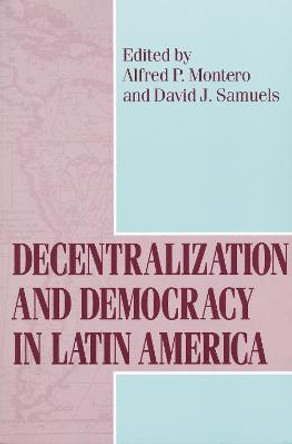Description
Tulia G. Falleti explains the different trajectories of decentralization processes in post-developmental Argentina, Brazil, Colombia, and Mexico, and why their outcomes diverged so markedly.
About the Author
Tulia G. Falleti is an Assistant Professor of Political Science at the University of Pennsylvania. Her work on decentralization, federalism, and research methodology has appeared in the American Political Science Review, Comparative Political Studies, Publius, Qualitative Sociology, Critique Internationale (France), Desarrollo Economico (Argentina), Politica y Gobierno (Mexico), and Sociologias (Brazil), as well as in edited volumes published in the United States, Argentina, and Brazil. She has received awards and fellowships from the Social Science Research Council, the United States Institute of Peace, the Ford Foundation in conjunction with the Latin American Studies Association, and the Ministry of Science, Technology, and Productive Innovation of Argentina. In 2006, she earned the Gregory Luebbert Award from the American Political Science Association for the best article in comparative politics for her article 'A Sequential Theory of Decentralization: Latin American Cases in Comparative Perspective.'
Reviews
"Sequence analysis meets subnational politics in this must-read study of decentralization in Latin America. Drawing on extensive original research in four countries, Falleti uses a new 'comparative sequence method' to show how decentralization reforms varyingly empower subnational political actors depending on when and in what order they are adopted. This fascinating argument is a shining example of the power of comparative-historical analysis and will become a touchstone for all future research on subnational politics in Latin America." -James Mahoney, Northwestern University
"Advocates and detractors of decentralization have assumed that it increases the power of subnational governments - whether for good or for ill. But what if they are both wrong? In this important and innovative work, Tulia Falleti offers a major corrective to the literature on decentralization by showing that decentralizing reforms do not necessarily enhance the resources, authority and capacity of subnational officials relative to the center. It all depends, according to Falleti, on the territorial interests (national or subnational) that dominate the initial decision to decentralize, along with the particular sequence of decentralizing reforms (administrative, fiscal and political) that is thereby set in motion. Based on exhaustive research in four major Latin American countries, Falleti offers a theory of decentralization that is both elegant and respectful of the complexities of her cases. This book should be carefully read not only by students of decentralization, but by the scores of development practitioners who are actively engaged in programs of support for decentralization across the developing world." -Kent Eaton, University of California, Santa Cruz
"Falleti's original sequential theory of decentralization persuasively explains the variation in the substance and effects of decentralization in Latin America's largest countries according to the timing of the entrance of the national and local actors onto the stage. Informed by more than one hundred and fifty in-depth interviews with top ranking politicians and extensive archival research, this marvelous book makes a compelling contribution to the study of Latin American politics." -Frances Hagopian, University of Notre Dame
"Tulia Falleti's study of decentralization in Latin America is a jewel of thoughtful, comparative analysis. Why is there so much variation in the autonomy of subnational governments? The answer is elegant and powerful: final outcomes depend heavily on initial reforms. A territorial coalition that prioritizes political over administrative decentralization carves a path to deeper subnational autonomy than one that prefers administrative over political decentralization. This is a must-read for anyone interested in decentralization." -Liesbet Hooghe, University of North Carolina, Chapel Hill
Book Information
ISBN 9780521736350
Author Tulia G. Falleti
Format Paperback
Page Count 312
Imprint Cambridge University Press
Publisher Cambridge University Press
Weight(grams) 420g
Dimensions(mm) 229mm * 152mm * 16mm









